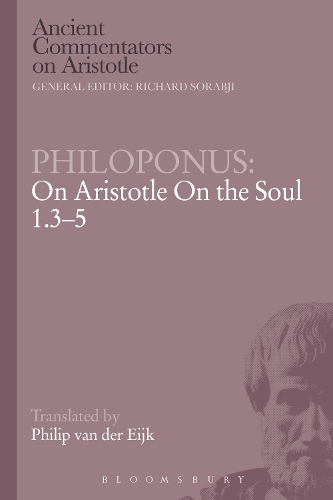
Philoponus: On Aristotle on the Soul 1.3-5
(Paperback)
Available Formats
Paperback
Published: 26th March 2014
Hardback
Published: 1st November 2011
Paperback
Published: 26th March 2014
Paperback
Published: 26th March 2014
Paperback
Published: 26th March 2014
Paperback
Published: 26th March 2014
Paperback
Published: 26th March 2014
Paperback
Published: 26th March 2014
Paperback
Published: 26th March 2014
Paperback
Published: 26th March 2014
Paperback
Published: 26th March 2014
Paperback
Published: 26th March 2014
Paperback
Published: 26th March 2014
Paperback
Published: 26th March 2014
Paperback
Published: 10th April 2014
Hardback
Published: 1st April 2010
Publishing Details
Philoponus: On Aristotle on the Soul 1.3-5
By (Author) Philoponus
Translated by Philip J. van der Eijk
Bloomsbury Publishing PLC
Bloomsbury Academic
26th March 2014
United Kingdom
Classifications
Tertiary Education
Non Fiction
128.1
Physical Properties
Paperback
240
Width 156mm, Height 234mm
331g
Description
Until the launch of this series over fifteen years ago, the 15,000 volumes of the ancient Greek commentators on Aristotle, written mainly between 200 and 600 AD, constituted the largest corpus of extant Greek philosophical writings not translated into English or other European languages. This text by Philoponus rejects accounts of soul, or as we would say of mind, which define it as moving, as cognitive, or in physical terms. Chapter 3 considers Aristotle's attack on the idea that the soul is in motion. This was an attack partly on his teacher, Plato, since Plato defines the soul as self-moving. Philoponus agrees with Aristotle's attack on the idea that a thing must be in motion in order to cause motion. But he offers what may be Ammonius' interpretation of Plato's apparently physicalistic account of the soul in the Timaeus as symbolic. What we would call the mind-body relation is the subject of Chapter 4. Plato and Aristotle attacked a physicalistic theory of soul, which suggested it was the blend, ratio, or harmonious proportion of ingredients in the body.Philoponus attacked the theory too, but we learn from him that Epicurus had defended it. In Chapter 5, Philoponus endorses Aristotle's rejection of the idea that the soul is particles and of Empedocles' idea that the soul must be made of all four elements in order to know what is made of the same elements. He also rejects, with Aristotle, definitions of the soul as moving or cognitive as ignoring lower forms of life. He finally discusses Aristotle's rejection of Plato's localisation of parts of the soul in parts of the body, but asks if new knowledge of the brain and the nerves do not require some kind of localisation.
Author Bio
Philip van der Eijk is Professor of Greek, Department of Classics, University of Newcastle-upon-Tyne.
